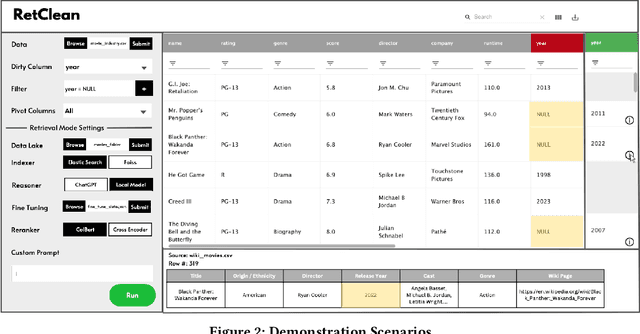Mohammad Shahmeer Ahmad
Cross Modal Data Discovery over Structured and Unstructured Data Lakes
Jun 07, 2023Abstract:Organizations are collecting increasingly large amounts of data for data driven decision making. These data are often dumped into a centralized repository, e.g., a data lake, consisting of thousands of structured and unstructured datasets. Perversely, such mixture of datasets makes the problem of discovering elements (e.g., tables or documents) that are relevant to a user's query or an analytical task very challenging. Despite the recent efforts in data discovery, the problem remains widely open especially in the two fronts of (1) discovering relationships and relatedness across structured and unstructured datasets where existing techniques suffer from either scalability, being customized for a specific problem type (e.g., entity matching or data integration), or demolishing the structural properties on its way, and (2) developing a holistic system for integrating various similarity measurements and sketches in an effective way to boost the discovery accuracy. In this paper, we propose a new data discovery system, named CMDL, for addressing these two limitations. CMDL supports the data discovery process over both structured and unstructured data while retaining the structural properties of tables.
RetClean: Retrieval-Based Data Cleaning Using Foundation Models and Data Lakes
Mar 29, 2023


Abstract:Can foundation models (such as ChatGPT) clean your data? In this proposal, we demonstrate that indeed ChatGPT can assist in data cleaning by suggesting corrections for specific cells in a data table (scenario 1). However, ChatGPT may struggle with datasets it has never encountered before (e.g., local enterprise data) or when the user requires an explanation of the source of the suggested clean values. To address these issues, we developed a retrieval-based method that complements ChatGPT's power with a user-provided data lake. The data lake is first indexed, we then retrieve the top-k relevant tuples to the user's query tuple and finally leverage ChatGPT to infer the correct value (scenario 2). Nevertheless, sharing enterprise data with ChatGPT, an externally hosted model, might not be feasible for privacy reasons. To assist with this scenario, we developed a custom RoBERTa-based foundation model that can be locally deployed. By fine-tuning it on a small number of examples, it can effectively make value inferences based on the retrieved tuples (scenario 3). Our proposed system, RetClean, seamlessly supports all three scenarios and provides a user-friendly GUI that enables the VLDB audience to explore and experiment with the system.
 Add to Chrome
Add to Chrome Add to Firefox
Add to Firefox Add to Edge
Add to Edge